

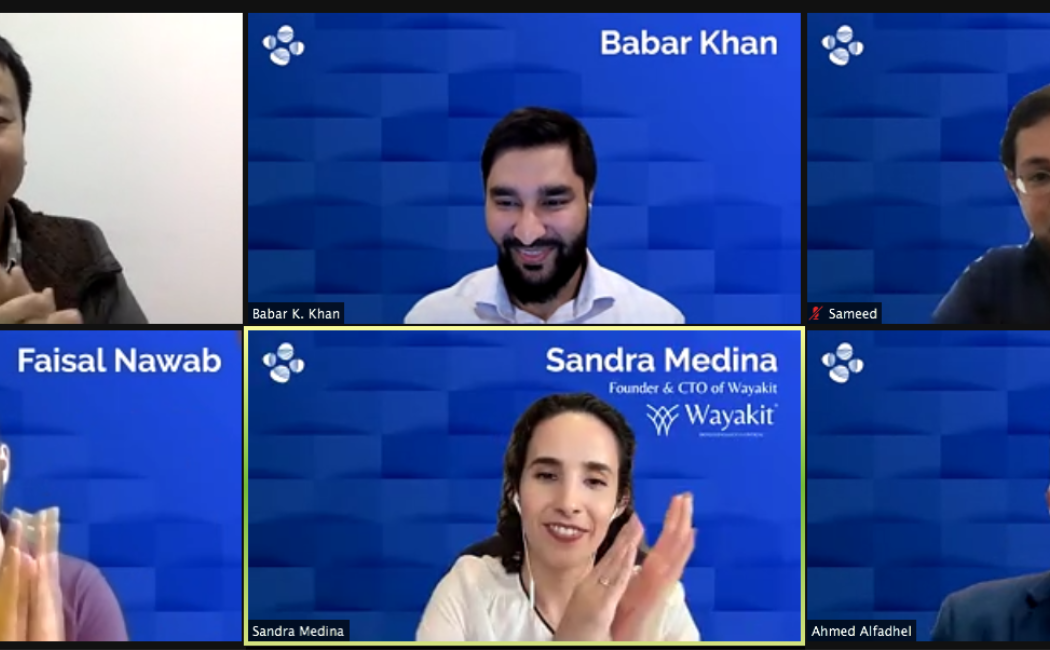
25 May, 2021
Recently, Alumni Affairs hosted the Global Startup Footprint, a virtual networking event for students past, present, and future to share and listen to alumni startup stories.
The event was moderated by representatives of KAUST’s Saudi Arabian Alumni Chapter Ahmed Alfadhel (PhD ‘16, MS ‘12), Chief Technologist, RPD Innovations, and Babar Khan (PhD ’18), Investment Manager - Food Technology, NEOM. The discussion touched on steps alumni panelists took to achieve their startup goals, with advice given to students and alumni who are future entrepreneurs. The panelists included Sandra Medina (PhD ’20), Arne Scheu (MS ’17), Muhammed Sameed (MS ’12), Faisal Nawab (MS ’11) and Jian Pan (MS ’10).
Turning an idea into a successful start-up
The most topical startup was WAYAKIT, a company whose products originated as organic spray-on laundry detergent created for frequent travelers, and later turned into anti-viral cleaning products when the pandemic hit. Sandra Medina, with Luisa Javier (MS ’11) and a current PhD student, founded the company in 2018.
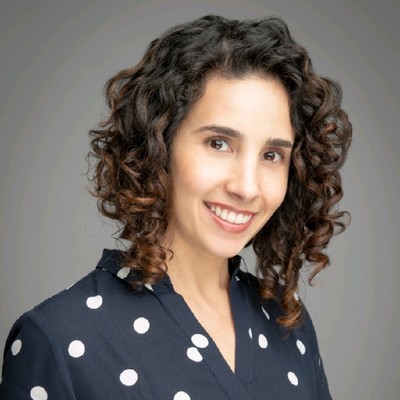
“Because I knew I wanted to work in industry after my PhD, I focused on very applied work in my research so that I would have an easy transition,” says Medina. “However, I did not have formal training in entrepreneurship, and that’s where the opportunities at KAUST really helped. In 2017, I met my co-founder, Luisa, who was already involved in entrepreneurship and we then got involved with the Innovation Cluster at KAUST.”
Directing the conversation, Khan highlights that it takes looking beyond research to find diverse ways to widen the impact of your science. Medina, in agreement, shares how her interest in startups was sparked through expanding her friend group.
“I am very socially active at KAUST even though I am [an] introvert. By engaging with other students, I heard stories about their startups, and I took advantage of those stories and events. It’s funny how we [research students] end up talking about our PhDs because we have nothing else to talk about,” jokes Medina. “But this is how I found out about KAUST startups. I really like the social engagement at KAUST, and I was always looking for different activities. And then, finding the announcement of the summer course in entrepreneurship was how I began my own startup story.”
After getting started, Medina realized the importance of creating a committed team for her company.
“It is important to be committed to the company, but also to deadlines, even deadlines set by yourself. Launch dates will always seems too soon, but it’s important to take them seriously. As our startup grew, it was more than just having fun ideas, and that was especially true when we started to receive funding,” says Medina.
Going it alone as a founder, or working with a team?
“It is also important to find trustworthy co-founders and team members. I had really found that in Luisa and realized how much more than a co-founder she was when we were getting ready to pitch our company to investors,” shared Medina.
Having a strong team has helped Medina and WAYAKIT in many ways. The launch of their laundry spray got attention in 2019, but the outbreak of COVID changed their product line drastically. Having a trustworthy and committed co-founder allowed WAYAKIT to pivot to anti-viral cleaning products during the peak of the pandemic.
“When COVID hit, I looked into the products being used to kill the virus and was surprised to see people using very toxic chemicals. We knew the laundry spray had anti-bacterial properties and wanted to know if it could kill viruses as well,” says Medina. “We got laundry spray tested to see if it could kill viruses, and while waiting for the results, we were hopeful it would work. If it did, we needed to have everything ready to launch a product as soon as possible. So, we started to work with customers, doing surveys about how cleaning habits have changed and how much they care about the virus.”
Medina and Javier’s hopes were answered with timely lab test results a month later.
“In March 2020, we received the results, which were amazing! The spray could kill 99.99% of viruses with only a 30-second contact time,” Medina exclaims. “We already had our team since we started with the laundry spray, so it was really easy to launch this product quickly. After getting certifications for the product in Mexico, Saudi Arabia and the US, we participated in the funding challenge at KAUST to pay for EPA tests which was $100,000. To make all of this successful, we changed our schedule completely to work with the time zone in Mexico. We were waking up at midday and having meetings until 5:00 am!”
Combining the job of PhD student, while a burgeoning entrepreneur
In the midst of creating the ground-breaking product, Medina had to balance her roles as a CEO and as a PhD student.
“At the same time, my December deadline for my PhD was getting closer and closer. Fortunately, my lab work was done, but I needed a lot of time to write,” says Medina. “It was hard to get everything done while working from home too, because I missed being with family and friends. Overall, it was a stressful, exciting, and emotionally difficult time.”
Although COVID did bring an unexpected benefit in business and product design for WAYAKIT, Medina is starting to plan for a post-COVID market.
“[After COVID] we will go back to the marketing for the laundry spray, but we do see how masks and cleaning products will be high priority for many years in highly populated places like airports and hospitals,” says Medina. “Our investors were very interested in the cleaning products during the peak of the pandemic, but they are also interested in our other products. And WAYAKIT is unique because we are all organic and do not include chemicals in our products that cause reproductive harm, which surprisingly are present in other product on the market.”
Having finished her PhD and graduating in 2020, and knowing the end of the pandemic is in sight, Medina envisions her future with WAYAKIT as one fully immersed in industry and serving the public with science-backed organic products. She advises those who are interested in startups to take advantage of the resources at KAUST.
“Take all the chances and opportunities at KAUST, they are free and very high quality. Most importantly, you will not find this kind of support anywhere else,” says Medina. “The Innovation Cluster at KAUST shows you what it takes to achieve a startup goal and what you can do with your own research to make a dream a reality.”
Discovering a new career path as an entrepreneur
Another KAUST alum shares how he transitioned from academia to industry. Arne Scheu, a KAUST MS Bioscience graduate, who recently completed his PhD at the University of Oxford as a Rhodes Scholar, co-founded Lilium X, a drug discovery company, in 2020.
“Professor Mark Tester at KAUST supported my MS research and helped me transition into bioelectrical engineering in my PhD,” says Scheu. “In regards to moving from academia to industry, the transition phase was actually very fluid, from working on applicable science in research to implementing it in industry. At Oxford and through the Y-Combinator accelerator program, my founding team had many competitions to test our ideas and present the company, and we were very successful in these competitions.”
However, Scheu’s transition away from academia was a newly discovered career path. Before the pandemic, Scheu had imagined he would continue to work in academia when he would work. If it did, we needed to have everything ready to launch a product as soon as possible. So, we started to work with customers, doing surveys about how cleaning habits have changed and how much they care about the virus.”
Medina and Javier’s hopes were answered with timely lab test results a month later.
“In March 2020, we received the results, which were amazing! The spray could kill 99.99% of viruses with only a 30-second contact time,” Medina exclaims. “We already had our team since we started with the laundry spray, so it was really easy to launch this product quickly. After getting certifications for the product in Mexico, Saudi Arabia and the US, we participated in the funding challenge at KAUST to pay for EPA tests which was $100,000. To make all of this successful, we changed our schedule completely to work with the time zone in Mexico. We were waking up at midday and having meetings until 5:00 am!”
Combining the job of PhD student, while a burgeoning entrepreneur
In the midst of creating the ground-breaking product, Medina had to balance her roles as a CEO and as a PhD student.
“At the same time, my December deadline for my PhD was getting closer and closer. Fortunately, my lab work was done, but I needed a lot of time to write,” says Medina. “It was hard to get everything done while working from home too, because I missed being with family and friends. Overall, it was a stressful, exciting, and emotionally difficult time.”
Although COVID did bring an unexpected benefit in business and product design for WAYAKIT, Medina is starting to plan for a post-COVID market.
“[After COVID] we will go back to the marketing for the laundry spray, but we do see how masks and cleaning products will be high priority for many years in highly populated places like airports and hospitals,” says Medina. “Our investors were very interested in the cleaning products during the peak of the pandemic, but they are also interested in our other products. And WAYAKIT is unique because we are all organic and do not include chemicals in our products that cause reproductive harm, which surprisingly are present in other product on the market.”
Having finished her PhD and graduating in 2020, and knowing the end of the pandemic is in sight, Medina envisions her future with WAYAKIT as one fully immersed in industry and serving the public with science-backed organic products. She advises those who are interested in startups to take advantage of the resources at KAUST.
“Take all the chances and opportunities at KAUST, they are free and very high quality. Most importantly, you will not find this kind of support anywhere else,” says Medina. “The Innovation Cluster at KAUST shows you what it takes to achieve a startup goal and what you can do with your own research to make a dream a reality.”
Discovering a new career path as an entrepreneur
Another KAUST alum shares how he transitioned from academia to industry. Arne Scheu, a KAUST MS Bioscience graduate, who recently completed his PhD at the University of Oxford as a Rhodes Scholar, co-founded Lilium X, a drug discovery company, in 2020.
“Professor Mark Tester at KAUST supported my MS research and helped me transition into bioelectrical engineering in my PhD,” says Scheu. “In regards to moving from academia to industry, the transition phase was actually very fluid, from working on applicable science in research to implementing it in industry. At Oxford and through the Y-Combinator accelerator program, my founding team had many competitions to test our ideas and present the company, and we were very successful in these competitions.”
However, Scheu’s transition away from academia was a newly discovered career path. Before the pandemic, Scheu had imagined he would continue to work in academia when he graduated from Oxford. However, lockdowns gave him a lot of time to reflect on how to tangibly make the world a better place, and that reflection led him out of academia.
“During your PhD is when you really get to see that academia is not all roses. It’s also at this time in your life when you have to really consider the future career path you want to pursue,” says Scheu. “I wanted to have an impact with the science that I am studying, which is why my trajectory of my academic career has moved more towards applicable science. Entrepreneurship was an attractive path to take, and I saw that being a better fit for me.”
Scheu is grateful for the opportunity to pursue a startup while finishing his PhD and would suggest others to follow a similar path if they are hoping to start their own company.
“You can definitely pursue a startup company while doing your research degree,” says Scheu. “It is actually a pretty common path for founders of startups, so don’t let that be intimidating. And the supportive entrepreneurship environment at KAUST will take care of you.”
Global, entrepreneurial experiences
Another speaker at the event, Jian Pan, a MS graduate in environmental engineering and a member of the founding class, shares his career path that led him to a startup in China.
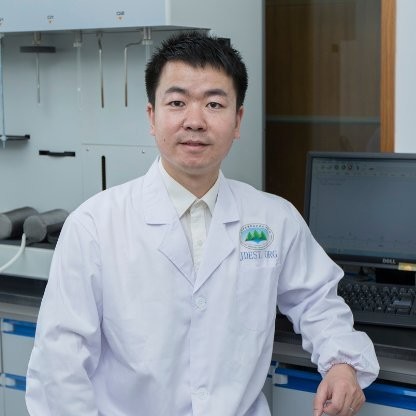
“When I moved back to China after living in Saudi for five years, I started working as the vice director of the Environmental Technology Innovation Center of Jiande, working on technology that reduces environmental pollution,” says Pan. “There I helped to incubate more than ten technology startups focused on sustainable batteries and biological wastewater treatment, which also included some of my own research.”
Pan’s interest in startups came through a direct need in the country.
“The reason why I am passionate about incubating technologies and initiating startups is because there is a large need for technology in China that will help to clean up water pollution,” says Pan. “Also, the startup environment in China is quite open and collaborative between industry and academia. There are plenty of funding sources and it is relatively easy for professors to start their own companies. The Chinese government is also very supportive of funding applicable science and I predict there will be more and more collaborations between scientists and businesses.”
However, these startup successes come with challenges as well. One challenge that touches on the personal side of running a business is the act of balancing work, life, and family commitments.
“It is important to know that the startup is a team, not an individual,” emphasizes Pan. “I am the CEO, and run the company as a whole, but I have an entire team to help run the business and the research. Ultimately, communication between co-founders and between me and my family members is really important. When we donate ourselves to explore something, it can be very time consuming, so we need to clarify the time to our family members and receive their support.”
The allure of entrepreneurship
Dr. Muhammed Sameed, a KAUST MS graduate in materials science and engineering and current research scientist at CERN, has had experience in multiple startups. He knows the importance of committing to family members and a business simultaneously.
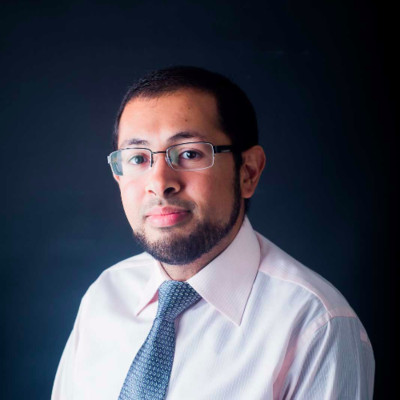
“I had a strong inclination to stay in academia, and then a nudge to entrepreneurship happened at KAUST when I attended the meetups and got to know more about startups,” says Sameed. “Entrepreneurship is like a bug, once you catch it, it’s hard to get rid of. So, once I caught the bug, my wife was very excited but also very apprehensive about me taking an entrepreneurship role as well as a full-time researcher. Your family are not just spectators, they are a part of your team. Sometimes family members step in when you need them and you can’t do it without their support.”
Balancing work and life commitments while starting a company is important, but so is the balance of research, business, and your own passions in the startup environment.
Real world applications VS research
“I have the desire to do both (academia and business), but time is the challenge, and currently I split my time between the research and the company,” says Sameed. “It is 50% for each now, but once we have customer validation, I might have to make the tough decision to spend more time in one side over the other. But it is good to know that there are always doors open to go back into academia after working on a deep-tech startup. It is possible to rotate between the two worlds.”
Many times, academia and industry are inextricably linked and full-time professors find their way into industry in some capacity. Although not a co-founder of a startup, Dr. Faisal Nawab, KAUST founding class member in computer science, and current Assistant Professor in computer science at the University of California, Irvine, works on Big Data management and Cloud Computing systems which are at the core of startups involving social networks, the Internet of Things (IoT), and smart cities. His experience has also been one of finding the right balance.
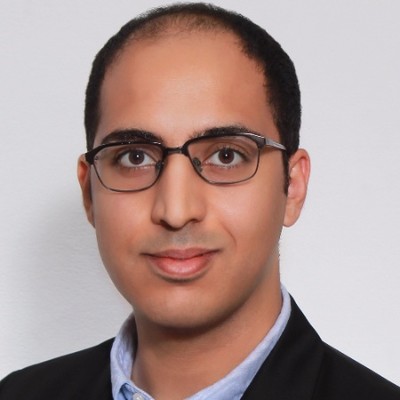
“My research is on both ends, commercializing a product and pushing the boundaries of science. They are actually complementary, and it can be problematic to be stuck on either side,” says Nawab. “If you are too focused on the science side you can miss the real-world application and big picture goal and if you are too focused on the company side you can miss new discoveries.”
In terms of advice he gives to KAUST students wanting to pursue a career in industry, Nawab says, “The relationship between student and advisor can be doubtful around non-academic career paths, but most of the time, KAUST professors have an interest in entrepreneurship as much as the students do. It’s important to ask yourself, ‘how much background experience do I have in my startup goal’, and ‘how much experience does the advisor have?’ Many PhD studies go deeper into topics that can be capitalized on through innovation or products. Try to align your goals with the advisor, lab, and environment.”
He also advises aspiring innovators to be aware of their professional and personal priorities while pursuing their goals.
“Social, spiritual, and physical health are important because they affect your professional life,” says Nawab. “This realization allows you to prioritize your time and you will not have guilt when you do something for yourself or your family.”
Juggling work-life balance as a start-up founder
Balance between work and life looks different for everyone, and for women CEOs, the choice of having children may be another priority to balance. Medina expresses how he desire to be a mother is another concern for the work-life balancing act.
“I am planning to have kids in a few years and I am struggling with this,” shares Medina. “I know that being a mother [and CEO] is difficult because of feeling guilty about not spending enough time your kids, but the conclusion is that we cannot do it alone. We need our friends and family, moms to take care of the kids, and a community to help and support. Friends become family in this business. Although my husband is busy with his PhD, he is good with planning and time management. You have to put effort into family time like you put effort into meetings with investors. I don’t say ‘I don’t have time’, I set priorities to make those things fit in.”
KAUST’s unique eco-system
In the world of startups and science research, KAUST supports all aspects of finding the right balance. With the accelerator program and free courses in entrepreneurship as well as the close community of alumni, friends and colleagues, the path to a career in the start-up industry is well paved and supportive at KAUST.